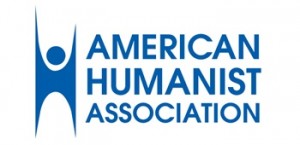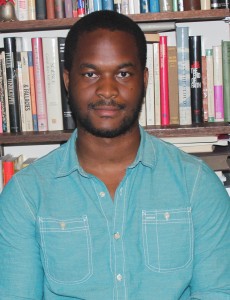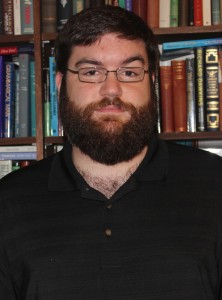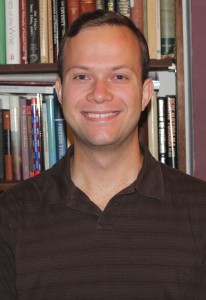Meet the AHA Summer Interns, Part I

We’re pleased to welcome six individuals to the American Humanist Association’s Summer 2015 Internship Program! They are working hard and contributing to our efforts by writing for TheHumanist.com, assisting on the production of the Humanist magazine, lobbying on Capitol Hill, promoting humanism in the media, and supporting AHA’s many programs and projects. Here we introduce three of our six wonderful interns. Read part two here.
EFOSA AKENZUA, Communications and Humanist Press Intern
 TheHumanist.com: What is your educational background?
TheHumanist.com: What is your educational background?
Efosa Akenzua: I recently graduated with a BA from the University of Chicago where I studied both political science and economics. In the future I plan to attend law school with a focus on constitutional and international law.
TheHumanist.com: How did you first learn about humanism?
Akenzua: I can’t say I really thought about or heard of humanism as an active belief system until I heard of the American Humanist Association. I grew up in western Los Angeles, the beloved land of carefree liberals, and then went to college in Chicago, but I never encountered someone who was in fact a humanist. Most people I knew were either very religious or not at all, and that was that.
TheHumanist.com: Did you grow up in a religious tradition? If so, which one and what was that like?
Akenzu: I grew up in a Christian (United Methodist) household. Going to church weekly in my childhood and adolescence was in many ways fun, pleasant and even interesting. Every Sunday morning had an indescribable aura—maybe it was the early morning wake-up call, or because we all dressed just a little bit smarter, or the fact that we walked through the gates of an old, creepy, yet waiting to be explored Gothic cathedral. Maybe it was because people were more willing to smile and say hello to me within the walls of that castle. In any case, as my adolescent self learned more about the absurdities with which humanity often busies itself, I found myself questioning the power of religion to do something. All these religious people, I thought, and still cruelty occurs. I did not blame religion, but I found no comfort in its shows and stories of concern for the hurting. I didn’t see how I needed it in order to make the change I wanted to make. To put it simply, though appreciative of religion’s allure, I gradually distanced myself from it, knowing that I would still be a good person whose thoughts and beliefs are instead oriented by the power of reason.
TheHumanist.com: What interested you most about interning for the American Humanist Association?
Akenzua: What interested me most about interning for the AHA was the ability to write about issues from the perspective of humanism. It’s not a liberal or a conservative perspective but one centered on the value of being human. I believe this stance creates all sorts of new insights into old debates and I’m eager to write about and explore them within the operations of the organization as a communications intern.
TheHumanist.com: Do you have a favorite humanist/atheist?
Akenzua: Hands down, it’s Bill Maher because the guy is just on point more often than most. From Real Time with Bill Maher to his production of Vice (both must-watch TV), Maher, unlike most media outlets, is working pretty hard to bring people something closer to the truth. That is something I respect and something I intend to do in my own way.
TheHumanist.com: Have you read any good books lately? What’s your favorite book?
Akenzua: I’d recommend Punishing the Poor: The Neoliberal Government of Social Insecurity by social/political theorist and UC Berkeley Professor Loïc Wacquant. I was first introduced to this book in a class called “Culture and Politics.” It’s a theoretical explanation based upon excellent reasoning and objective research on why the minority poor in the United States are victims to a neoliberal turn in sentimentality that entails a reduction of welfare and an increase in what he calls “workfare” coupled with an increase in incarceration. His apt analogy for this is to think of the “iron fist” of the penal policy as replacing Adam Smith’s “invisible hand.”
TheHumanist.com: If you could have dinner with any three people (living or dead), who would they be and why?
Akenzua: I would first invite Malcolm X, a man dedicated to understanding the truth of his existence and that of his people. His fiery intellectual intolerance for the oppressive racist system that the United States subjected an entire sect of humanity to resonates with me. I believe he could have been an even more powerful voice if racist mob violence had not forced his thinking toward the use of such violence. I would love to discuss with him the state of humanity at large and, more specifically, humanity of African descent.
I would also invite Michel Foucault. He is an intellectual giant and a conspiracy theorist with a passion for tackling reality head on with a store of unrivaled historical theory. I would love to see Malcolm X and Foucault play off each other’s strengths and weakness—what a lesson that would be.
And since the earth is not the only thing in existence in the universe, I’d invite Stephen Hawking and have him explain all his theories to the rest of us and share his predictions for the future.
MATT CERAMI, Editorial Intern
 TheHumanist.com: What is your educational background?
TheHumanist.com: What is your educational background?
Matt Cerami: It’s pretty straightforward—I’ve been a dedicated humanities nerd for my entire academic career. I received bachelor’s degrees in both English and philosophy from Stony Brook University, briefly studied at the University of Missouri as a graduate student in religious studies, and ultimately returned to Stony Brook to receive my master’s in bioethics and medical humanities.
TheHumanist.com: How did you first learn about humanism?
Cerami: Unlike perhaps the majority of people here, I did not always identify as a humanist—in fact, I’ve spent most of my life dwelling on quite the opposite side of the spectrum. It’s the darker side of non-belief that I think most atheists are all too happy to ignore or otherwise dismiss. The realization that God was not real, that religion was a farce (and that so many people could buy it), that humans were cosmically insignificant, and that life had no inherent meaning, spurred in me a much darker and more apathetic ideology than humanism—and so, for most of my life, if you would’ve asked, I would’ve told you that I was a pessimist, a cynic, a misanthrope, and a nihilist (and not particularly in that order). Add to this volatile mixture a pinch of moral relativism, a hint of fatalism, and a belief in the genetically predetermined horribleness of human beings, and you’ll start to get the picture. I have always been liberal, and have always been for human rights, but in the face of the large-scale atrocities that humans perform on each other daily, I thought that fighting for people—or fighting for anything—was a rather futile and ultimately pointless endeavor.
It was in discovering Carl Sagan—and more specifically, this video of his “Pale Blue Dot” speech—that I began to have a change of heart. I watched this video daily for about a month, and still now return to it whenever I find myself in need of perspective. Sagan was the first to show me that the cosmic insignificance I lamented over could instead be taken as a virtue—that indeed, it must be taken as a virtue—and that it underlined an obligation to be better, kinder, more compassionate, and more empathetic towards one another. I began to see that a lack of meaning only meant the freedom to create my own meaning, that all boundaries between people were ultimately invented and arbitrary, that the happiness of any individual is inextricably linked to and dependent upon the happiness of all others, and that morality—in accordance with the empathy and altruism encoded in our DNA—demands alleviating the suffering and promoting the wellbeing of all living things, wherever we may find them. “For small creatures such as we,” Sagan once said, “the vastness is bearable only through love.”
TheHumanist.com: Did you grow up in a religious tradition? If so, which one and what was that like?
Cerami: My family identifies as Catholic in name only—and though I’ve been pushed through baptism, communion, confirmation, religion class, and the rest of the mechanisms of the Catholic Church, it was more out of an adherence to tradition and societal expectation than any profound religious belief. I have always been completely free to think and believe whatever I’d like, and I’ve been an atheist, I like to say, since the day of my first communion. You could catch an eight-year-old me causing trouble in religion class by asking why Jesus was considered real but Zeus was not.
My father has a deep aversion to, and a knack for identifying, any person or institution that would seek to manipulate or control him in any way, so his relationship with religion has historically been tenuous at best. These days he holds to deistic sentiments and not much else. My mother is the most traditionally Catholic person in the family, though she’s incorporated into her worldview bits and pieces from perhaps every superstition, spirituality, and religious tradition that has ever existed—so hers is a faith that’s difficult to pin down, and she applies those beliefs liberally and only in ways that enhance her kindness and compassion.
TheHumanist.com: What interested you most about interning for the AHA?
Cerami: I had known about the AHA for quite some time before my internship, and I often applauded their relentlessness in doing the legal dirty work necessary to stem the tide of theocracy that’s currently flooding the country. More broadly, I appreciate that they perform their work thoughtfully, with sophistication, and without the kind of juvenile venom you might encounter elsewhere in the secular community. To the point: I wanted to lend my voice to their fight in promoting the rights and wellbeing of oppressed minorities across the globe.
TheHumanist.com: Do you have a favorite humanist/atheist?
Cerami: Tim Minchin and James Randi are two of my favorite people on the planet—though, if we’re talking academics, I have to admit that, even though I’ve parted ways with him on many issues, I could listen to Sam Harris talk all day. I also don’t think I’ve ever disagreed with anything that Bertrand Russell has ever said. Lastly, I think Twilight Zone creator Rod Serling is one of the most brilliant writers who ever put pen to paper, and is overlooked as a purveyor of humanistic wisdom.
TheHumanist.com: Have you read any good books lately? What’s your favorite book?
Cerami: I’m currently making my way through Gore Vidal’s Imperial America, which is a bit light on substance compared to his other work, but still full of classic Vidal laugh-out-loud one-liners. My favorite book of all time is Blood Meridian by Cormac McCarthy. It’s both an artistic masterpiece—with its indescribable, almost impenetrable prose—that changed forever the way I think about the function and purpose of art, and one of the best meditations on human nature that has ever been written. It took me six months to finish, and I was a different person by the end—it altered entirely my perception of life and of human beings, and perhaps not for the better.
If we’re talking pop-fiction, I’ll go with something lighter: Stephen King’s Dark Tower series was my obsession for several years. And if we’re talking secular literature, Carl Sagan’s Demon-Haunted World is the book that started pulling me away from more vitriolic atheism and towards something bigger.
TheHumanist.com: If you could have dinner with any three people (living or dead), who would they be and why?
Cerami: Rod Serling, who I think is the greatest screenplay writer who ever lived, and a champion of humanism, liberalism, and rationality; James Baldwin—his prose is elegant, rhythmic, and poetic and his commentary, especially on race relations in the United States, is unrelentingly ferocious; and George Carlin: a genius, radical, revolutionary, writer, philosopher, linguist, social critic—am I missing anything? Carlin’s desire to savagely deconstruct every institution that humans have ever built has influenced most of the decisions I’ve ever made.
I don’t think I’d be doing much talking at this dinner. And why should I? The amount of collective erudition, wit, and intelligence at this particular party would be enough to fill all the parties that have been and will ever be. And if, by chance, these guys are busy, I’ve got Carl Sagan, Jon Stewart, and Stephen Colbert on back-up.
NICK BIDWELL, Legal Intern
 TheHumanist.com: What is your educational background?
TheHumanist.com: What is your educational background?
Nick Bidwell: I went to an all-boys Catholic high school in San Diego, California. I did my undergraduate studies at University of California, Irvine where I got a BA in political science and a BA in sociology. I just finished my first year of law school at George Washington University Law School here in DC. I’m not sure exactly what area of law I will pursue, but I am interested in both public policy and administrative law.
TheHumanist.com: How did you first learn about humanism?
Bidwell: I first learned about humanism, and the AHA itself shortly after I graduated from college. I was interested in getting involved in with policy groups as a volunteer and while researching ones like the ACLU of Orange County, I stumbled on the Freedom from Religion Foundation. From there I learned about the AHA and began looking into what humanism is and what the organization did.
TheHumanist.com: Did you grow up in a religious tradition? If so, which one and what was that like?
Bidwell: I grew up as a Greek Orthodox Christian, and went to Catholic school from kindergarten through the end of high school. I was very involved in my church (I was the head altar server for almost four years), however, it was almost more of a cultural affiliation than a religious one. I mostly just went through the motions and never put too much thought into the meaning behind it. When I did, it just didn’t make sense to me anymore. My family members all believe in their faith, and I did too until I came to this understanding partway through college. However, my family consists of all progressive Democrats who recognize that there is much more to life than religion.
TheHumanist.com: What interested you most about interning for the American Humanist Association?
Bidwell: I was mainly interested in the work that the Appignani Humanist Legal Center does. As a legal intern, the prospect of working on actual litigation, and in an area I enjoy, is a really exciting idea. To get this kind of experience after only one year is that much more amazing.
TheHumanist.com: Do you have a favorite humanist/atheist?
Bidwell: Neil deGrasse Tyson. I like how he can debate people so well while still being incredibly respectful of others’ beliefs. Also, he can take the most mundane topics and get you really excited about them. His version of Cosmos is a must-see!
TheHumanist.com: Have you read any good books lately? What’s your favorite book?
Bidwell: I’ve actually been catching up on my reading this summer, now that I’ve put the casebooks down for a while! I just finished reading The Forever War by Joe Haldeman and loved it (I’m a bit of a sci-fi nerd). I’m currently reading Tom Clancy’s Op-Center: Out of the Ashes. I don’t have a single favorite book, but if pressed, I would probably go with the Lord of the Rings trilogy.
TheHumanist.com: If you could have dinner with any three people (living or dead), who would they be and why?
Bidwell: President Jimmy Carter, Neil deGrasse Tyson, and Stephen Colbert (the actual person, not his TV character). They are my favorite president, scientist/ public figure, and entertainer, respectively. I think the conversation between the three would be absolutely amazing!
